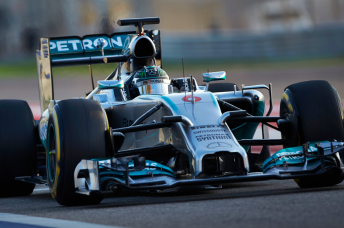

Nico Rosberg admits that even pre-race favourites Mercedes remain concerned over reliability ahead of this weekend’s Rolex Australian Grand Prix.
The German, tipped as one of the drivers most likely to win Sunday’s 30th running of the Australian Grand Prix, has revealed the Mercedes team have been working around the clock to ensure the two cars reach the chequered flag.
“For sure, reliability is a concern for everybody and it will be tough to get to the end of the race,” Rosberg told media including Speedcafe.com in Melbourne.
“(But) the team has done an amazing job so I’m confident we can do it.”
Reliability will be an important factor in deciding the outcome of the season opener as teams have struggled to get on top of the new for 2014 regulations.
Pre-season testing has been dominated by a number of mechanical issues limiting teams from gaining valuable mileage on brand new mandatory 1.6 litre V6 turbo charged engines and electrical energy recovery system components.
However, Rosberg’s Mercedes has led the way in testing, recording 5,000km of track time including several race runs.
The squad have not avoided engine and gearbox issues, however, causing the second highest number of red flags of any team across the three pre-season tests.
Despite appearing to be the class leaders on pace, the team and Rosberg are by no means 100 per cent confident in the reliability of the W05.
“From the point of reliability for sure some cars will stop and probably some won’t even make it off the grid as they will break down before the green light,” said Rosberg.
“To get to the end of the race is going to be a challenge.
“It has taken a lot of effort from everyone in the team and just before we left there were people working long into the night and early hours of the morning putting the engines together and producing the last few pieces to bring here.
“Its a very tough time.”
Another factor drivers will have to contend with this season is the decrease in fuel allowance for the race. This year drivers will be forced to use a maximum of 100kg (135 litres) of fuel for the race which is a third less compared to last year.
As a result, those who possess a more economical driving style will be rewarded, which Rosberg believes will be a crucial factor in 2014.
“It is something I enjoy working on this whole new technical aspect,” he said.
“It is something I am going to try and optimise and I’m sure everyone else will be doing the same.
“Its an interesting direction and a new challenge with this extreme form of fuel saving that is going to be required.”
*See below for the comprehensive Speedcafe.com F1 guide to the Australian Grand Prix




















